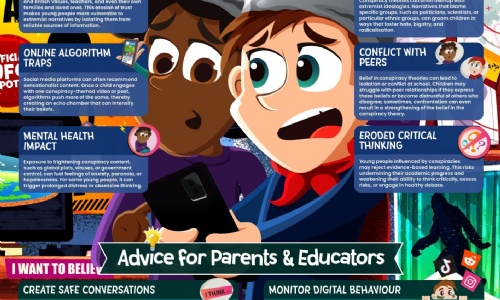
What Parents & Educators Need to Know about Conspiracy Theories

The latest update to the DfE guidance document, ‘Keeping Children Safe in Education’ (KCSIE) identifies the safeguarding concerns posed by conspiracy theories. This guide will help you to understand the risks, spot the signs, build children’s resilience and safeguard against the harmful effects of conspiracy theories.
The latest update to ‘Keeping Children Safe in Education’ includes clarification that misinformation, disinformation and conspiracy theories are recognised safeguarding harms. Although they might seem far-fetched, for many people they are very convincing – especially when presented by persuasive influencers or sensationalist videos online. This guide unpacks the risks, including isolation, anxiety, and exposure to extremist content, that can arise when conspiracies go unchecked.
It also highlights how conspiracy theories can erode critical thinking and trust in reliable sources – including schools, families, and the media. With practical advice for nurturing curiosity, encouraging scepticism, and safeguarding children’s digital experiences, this edition of Wake Up Wednesday helps adults to tackle tricky topics in a calm and confident manner.
Sources:
- KCSIE 2025: https://www.gov.uk/government/publications/keeping-children-safe-in-education--2
- DfE Filtering and Monitoring Standards 2023: https://www.gov.uk/guidance/meeting-digital-and-technology-standards-in-schools-and-colleges/filter…
- Educate Against Hate: https://educateagainsthate.com
- Centre for Countering Digital Hate (CCDH): https://www.counterhate.com
- Ofcom Children and Parents Media Use Report: https://www.ofcom.org.uk
